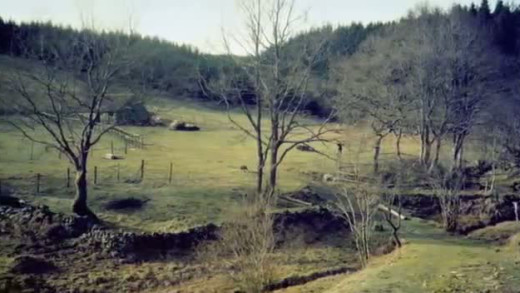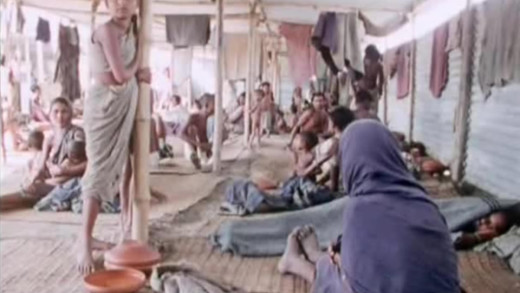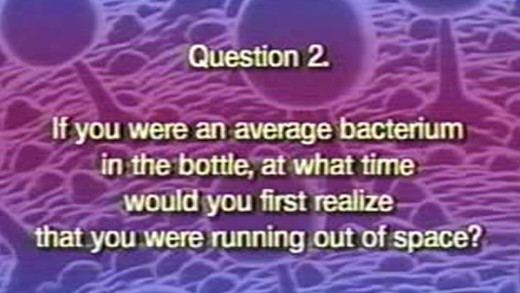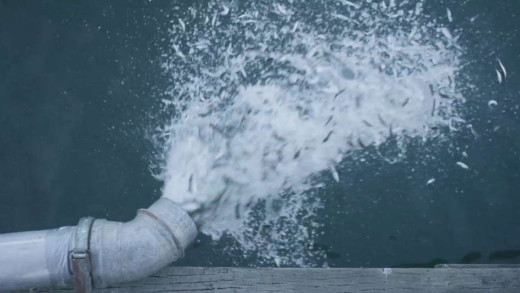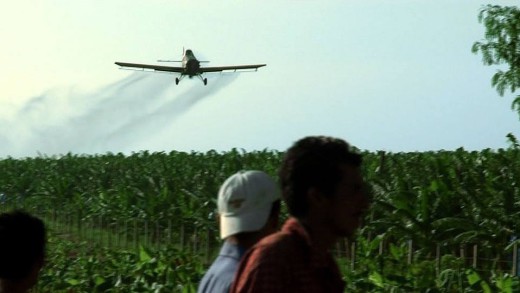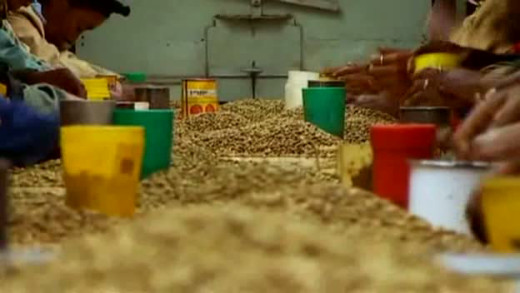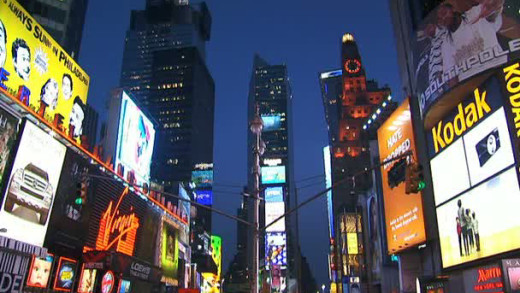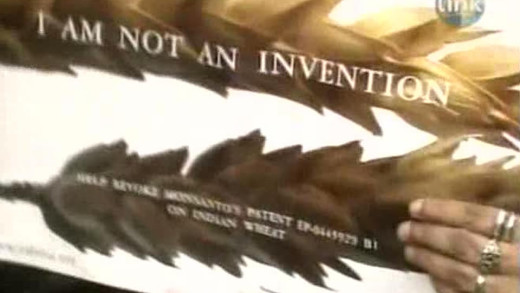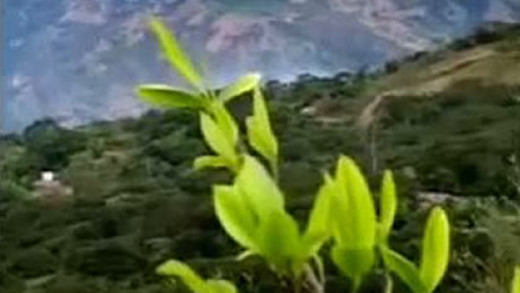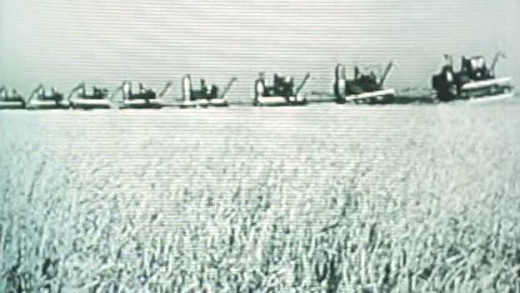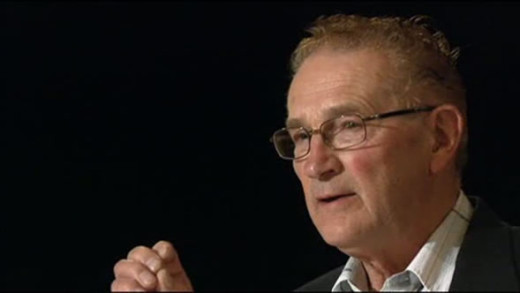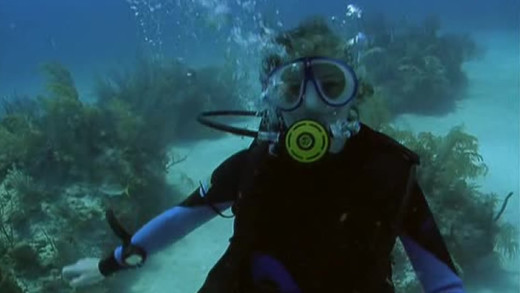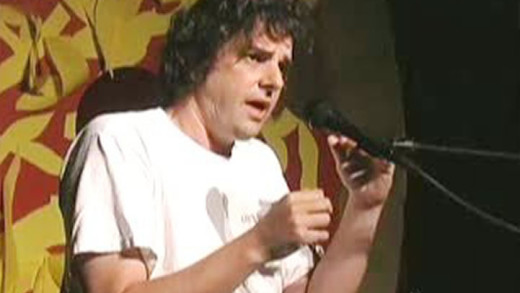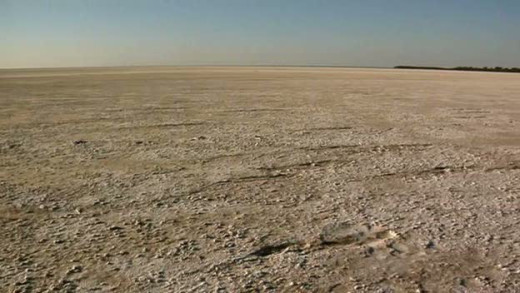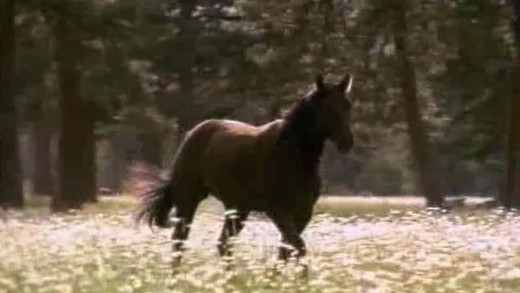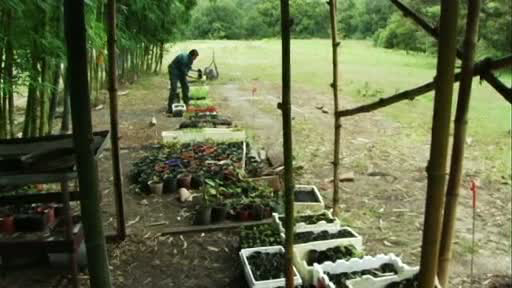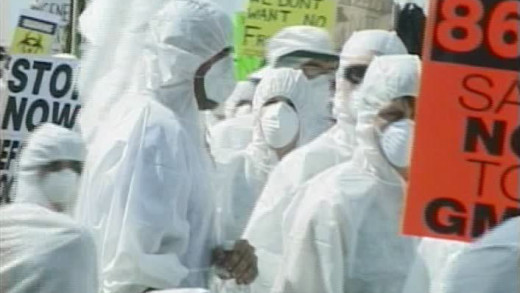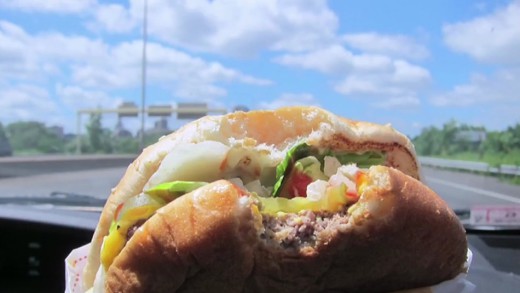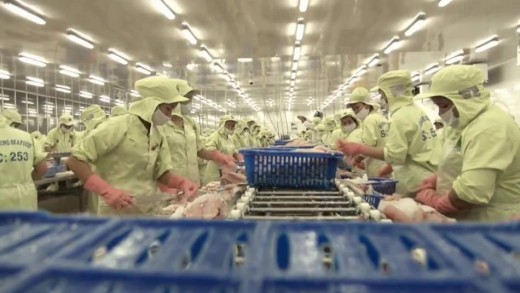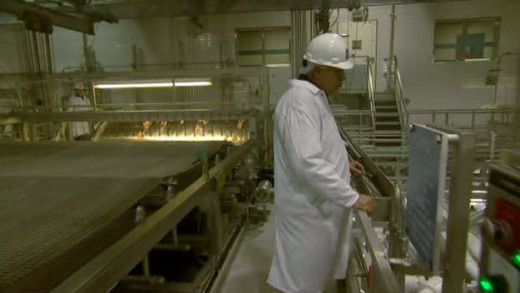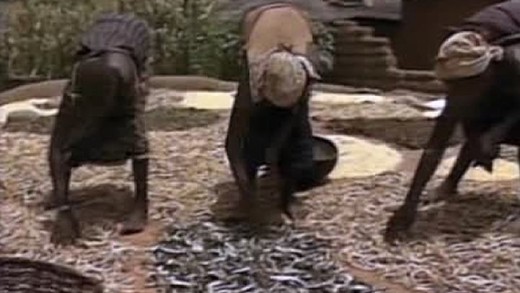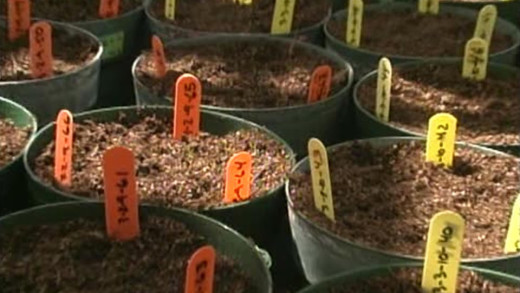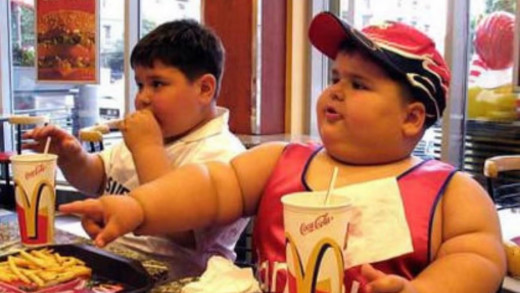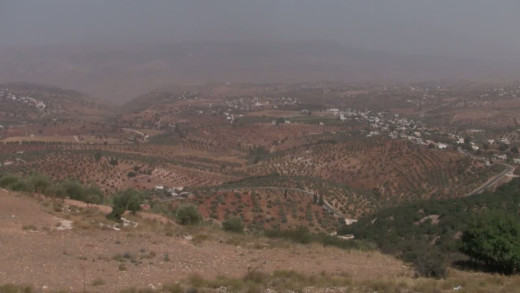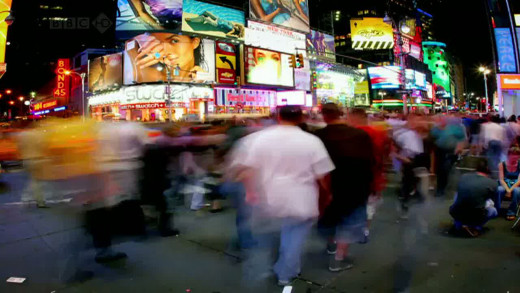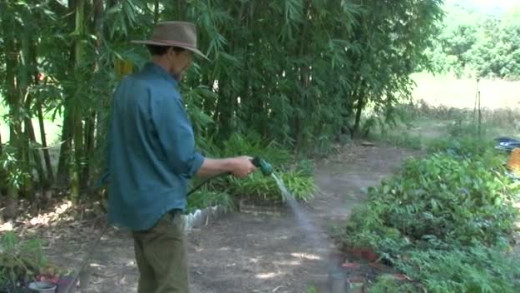A Farm For The Future follows wildlife film maker Rebecca Hosking as she investigates how to transform her family's farm in Devon, England, into a low energy farm with future peak energy concerns considered. With her father close to retirement, Rebecca returns to the farm to become the next generation to work the land, and the journey begins as she realises that all food production in the UK is completely dependent on cheap, abundant fossil fuel, particularly oil. After setting out to discover just how 'secure' the oil supply is and being alarmed by the answers, Rebecca is motivated to explore ways of farming without using fossil fuel. With the help of pioneering farmers and growers, A Farm For The Future shows that it is actually a return to nature that holds the key to farming in a low-energy future.
John Pilger travels to Bangladesh to report on the horrors of the famine in the country, its causes and tragedies, circa 1975. With people passing away on the street on a daily basis from starvation and US foreign policy continually ignored, An Unfashionable Tragedy documents the plight that continues to this day, showing that food is a powerful weapon, more powerful than oil...
The film is a video essay by Professor Albert Bartlett essentially serving as an introduction to the concept of steady growth and doubling time, by taking us through the impacts and consequences of exponential growth on a finite planet. By making good observations of this impossible growth as applied to fossil-fuel consumption, population and the endless growth of which the global economy requires, this presentation gives us the basic tools to fundamentally understand that we've got a real problem on our hands.
Artifishal is a film about people, rivers, and the fight for the future of wild fish and the environment that supports them. It explores wild salmon’s slide toward extinction, threats posed by fish hatcheries and fish farms, and this culture's relentless pursuit of engineering, mechanisation, and commodification in the face of environmental collapse. The film shows how fish hatcheries and fish farms threaten wild salmon populations, which in-turn has wide effects on the rest of the environment, but instead of helping wild salmon recover, this culture powers on with hatcheries and farms at great cost, both economically and ecologically. Artifishal explores the process, and what's at stake if this culture continues its destructive path.
Bananas!* documents the legal battle of banana plantation workers in Nicaragua against the Dole Food Company over cases of sterility caused by the pesticide DBCP. The chemical, despite being banned, was knowingly sprayed on crops and workers. The result is the same old battle with corporate power as the film unpacks the issues of the case and the lives of the workers through the local lawyer Juan Dominguez. Dominguez bridges the gap between the rapacious North American company and the South American workers who were not told about or protected from the pesticide, to make a claim against one of the largest corporations in the world for justice for its workers.
As westerners revel in designer lattes and cappuccinos, impoverished Ethiopian coffee growers still suffer the bitter taste of injustice. Black Gold follows the multi-billion dollar coffee industry down to the ground with the story of one man's fight for a fair-trade...
Blind Spot investigates the convergence of causes behind the current crisis of global industrial civilisation. By establishing the links between fossil fuels and the falsehood of perpetual exponential economic growth, Blind Spot explains the draw down of the natural environment, and how this globalised culture is systematically killing the world in its path. The energy depletion scenario known as Peak Oil—which came to pass around 2006—requires this culture to change drastically, with dire consequences either way. By whatever measure of greed, wishful thinking, neglect or ignorance, this current way of life cannot continue and the clock is ticking fast for change.
Bullshit follows environmental activist Vandana Shiva as she travels around the world to in her quest to eliminate the use of genetically modified foods and seeds in her home country of India and other developing countries. Shiva argues that the “ownership of life” through the patenting of natural products, namely grains altered through genetic modification (GMOs), is not in our best interests, and is in fact harmful to agriculture in developing countries...
Coca Or Death delves into Bolivia -- a country torn apart by the demands of the western world for coca. This film investigates why bloody battles have broken out between farmers and armed troops on the streets of La Paz, and what the impact of privatisation is having through the country. Coca has become a symbol of national resistance in Bolivia...
Collapse is a documentary film exploring the theories, writings and life story of controversial author Michael Ruppert, a former Los Angeles police officer turned investigative reporter who has authored books on the events of the September 11 attacks, documented widespread drug trafficking and other secret operations by the CIA, and written on the issue of peak oil and other energy issues. Using archival footage interspersed as illustration, Collapse explores Ruppert's conclusions that unsustainable energy and financial policies have led to an ongoing collapse of modern industrial civilisation...
Supported by a mix of archival footage, NASA shots of burning oil fields and historical film excerpts, Crude Awakening examines peak oil. From Houston to Caracas, the Lake of Maracaibo, the Orinoco delta, Central Asia's secretive republic of Azerbaijan with its ancient capital Baku and the Caspian Sea, to London and Zürich. The film questions the future of oil with leading authorities such as oil investment banker Matthew Simmons, former OPEC chairman Fadhil Chalabhi, Caltec's head of physics, Professor David Goodstein, Stanford University political scientist, Terry Lynn Karl and peak oil expert, Matthew Savinar...
Imagine that a storm blows across your garden and that now, without your knowledge or consent, foreign and genetically-modified seeds are in your vegetable patch which you have nourished and maintained for over 50 years. A few days later, representatives of a large multi-national corporation secretly visit your home, only to return later and demand that you surrender all your vegetables and seeds. Then, they file a lawsuit against you for the illegal use of their patented and genetically-modified seeds that you never planted or used and, what's more, the court rules in favour of the corporation. Yet, you still fight back. This is the true story of Percy Schmeiser versus Monsanto.
Having received a tip from an employee at a farm where animals were being abused, including a claim that pigs were being hung by chains and strangled to death as a form of 'euthanasia,' the Humane Farming Association (HFA) turns to an undercover investigator going by the name of "Pete." While wearing a hidden camera, Pete secretly films while he works undercover as a farmhand at Wiles documenting numerous incriminating scenes, including piglets being tossed into crates from across a room, impregnated sows held in pens impeding their ability to move, an unhealthy piglet being hit against a wall to kill it, and a sick sow being hung by a chain from a forklift until it choked to death. Having obtained this evidence, Pete concludes his investigation and quits the job at the farm. In the subsequent trial carried by the HFA, the prosecutors and the defence argue the legality and morality of these practices. The presiding judge describes it as "distasteful and offensive," however, rules that such are the realities of factory farming...
Deep Trouble covers the concerns of commercial fishing from a global perspective. Many species of fish that are eaten every day all around the world are now seriously threatened or are critically endangered. The Southern Bluefin Tuna for one. Mainstream awareness of where market fish come from let alone how endangered they might be is minimal. As fish stocks dry up, supermarkets are now offering new and strange species from the deep sea. Bizarre-looking creatures are being dragged up in vast fishing nets from depths of 1,000 metres or more, and the methods used to catch them are horrifying. How sustainable is this?
What if you live in the most destructive culture ever to exist? What if that culture refuses to change? What do you do about it? Derrick Jensen, the author of Endgame responds to these imperative questions and details how industrial civilisation and the persistent and widespread violence it requires is ultimately unsustainable—and what to do about it. Jensen weaves together history, philosophy, environmentalism, economics, literature and psychology to produce a powerful argument that demands attention...
Made from the same elements as stars, plants, food and human beings, dirt is very much alive and very much just as complex. One teaspoon of dirt contains a billion organisms working in balance to sustain a series of thriving communities that have become pretty much totally invisible to our daily lives. Dirt -- The Movie tells the story of Earth's most valuable and underappreciated source of fertility, from its miraculous beginning to its tragic degradation...
Humanity is absolutely dependent on animals as part of life. In industrial society however, this has extended to animals as pets, 'entertainment' and for expendable use in scientific research -- animals are tortured for 'scientific tests', locked in cages as pets and at the zoo and are bred on mass for cheap meat. What does this say about industrial civilisation? Earthlings conducts an in-depth study into pet stores, puppy mills and animals shelters, as well as factory farms, the leather and fur trades, sports and entertainment industries, and the medical and scientific profession, using hidden cameras to directly show the day-to-day practices of some of the largest industries in the world...
Going from classroom to real world, Establishing A Food Forest The Permaculture Way explains the patterns of a Food Forest and the essential principles of building a self-sufficient, sustainable way to eat. The film ends up at Tagari Farm which was abandoned years ago, but planted according to permaculture design principles. Did the Food Forest survive on its own?
As the biotechnology industry spends more than $50 million a year to convince us that 'genetic technology' is our only hope for feeding the world and saving the environment, toxic agricultural chemicals continue to poison the air, food and water and put farm workers in serious danger. So what's the real problem? Using archive footage and interviews with farmers, scientists, government officials and activists, Fed Up With Genetic Engineering presents an overview of the current food production system, exploring the impacts of pesticides, the resistance of biotechnology companies to food labelling and the links between government officials and major biotechnology and chemical companies...
Over the past three decades, obesity rates in the United States have more than doubled for children and tripled for adolescents, and a startling 70% of adults are now obese or overweight. The result has been a widening epidemic of obesity-related health problems. But while discussions about this crisis tend to focus solely on the need for individual responsibility and more exercise, Feeding Frenzy turns its focus squarely on the responsibility of the processed food industry and the outmoded government policies it benefits from. It lays bare how government subsidies designed to feed the hungry during the Great Depression have enabled the food industry to flood the market with a rising tide of cheap, addictive, high calorie food products, and offers an engrossing look at the tactics of the multi billion-dollar advertising industry that makes sure that everyone keeps consuming.
In the past 40 years, global consumption of fish has doubled. Having decimated natural fish populations globally, the industrial food system has turned to mass-scale farming practices in order to sustain the unsustainable, supplying huge supermarket chains and commercial food outlets with cheap processed fish products. What do we know about this and these processes? And what of the lives of the fish? What about their health and the health of the waters in which they're taken? Fillet-Oh!-Fish is the result of yet another indictment of the industrial food system, agriculture and factory farming—all of which have egregious implications to the health and well-being of species, and the planet as a whole. We see myriad mixes of pesticides and other chemicals, leading to toxic rivers and streams, the pervasiveness of the industrial food system, with glimpses into working conditions and processing methods, as well as the perniciousness of globalisation, with the world-wide reach of this crazy system that has hijacked a fundamental life-giver: food.
What does the corporate-controlled food industry look like? Film-maker Robert Kenner lifts the veil on today's food industry, exposing the underbelly that has been hidden from view of the consumer with the cooperation of government regulatory agencies such as the USDA and FDA. The food supply is now controlled by a handful of corporations that put profit ahead of consumer health, the livelihood of the farmer, the safety of workers and of course, the environment. We have bigger-breasted chickens, the perfect pork chop, herbicide-resistant soybean seeds, even tomatoes that won't go bad. But we also have new strains of E. coli—the harmful bacteria that causes illness for an estimated 73,000 Americans annually; are riddled with widespread obesity, particularly among children; and an epidemic level of diabetes among adults. And the whole mess is exacerbated by opportunistic politics—the tools of Big Agriculture running the very regulatory agencies that are supposed to protect the public—and consumers who have become accustomed to eating whatever they want whenever they want, in quantities they don't need...
Is the human population going to outstrip the Earth's food supply? The effects of modern agriculture not only lead to a short term food surplus which quickly slipped as population boomed, but agriculture itself causes huge environmental problems such as soil erosion, salinity and chemical pollution—all further illustrating an impossible system in perpetuity. Food or Famine looks at projects in North America, Chile, Indonesia, Africa and India which are participating in a worldwide movement to return to local food growing methods based on the land and healthy ecological principles. The film also examines the worldwide imbalance between food consumption and production, stoking the need to confront the mounting challenges ahead...
In the "race to feed the planet", scientists have discovered how to manipulate DNA and produce what they claim are stronger, more disease-resistant crops. However, fears that Genetically Modified Food may not be safe for humans or the environment has sparked intense protest. Are we participating in a dangerous global nutritional experiment? This film asks is the question -- is the production of genetically modified food a panacea for world hunger or a mass poisoning of the worlds food supply?
Globesity exposes the explosion of global obesity by following how fast food corporations have infiltrated countries where just a few decades ago hunger was a headline health concern. The film travels to China where the consumption of sugar has skyrocketed, to Brazil where corporations such as Nestlé have fundamentally altered traditional diets, to India where it’s predicted that 100 million people will be suffering diabetes in the not-too-distant future, and on to Mexico--the biggest consumer of soft drink in the world--where diabetes is already the number one killer. The film is one illustration of many of how vast corporate operations further destroy traditional communities and usurp basic needs like food...
Greening The Desert follows permaculturalist Geoff Lawton and his team to the Jordan desert where they transform 10 acres of the arid desert into a lush, thriving, food producing garden. In a massive transformation, the team develops a system to harvest rainwater, creates swells with over a foot of mulch and designs the system to reduce salt levels in the soil dramatically—only a few miles from the Dead Sea.
Is the world heading for a population crisis? Since 1950, the human population has more than doubled. What is the effect of this rapid growth on the environment? While much of the projected growth in human population is likely to come from the so-called "developing world," it is the lifestyle enjoyed by the West that has the most impact--in the UK consumers use as much as two and a half times their fair share of Earth's resources. This film examines whether it is the duty of individuals to commit not only to smaller families, but to change the way they live for the sake of humanity and planet Earth.
Introduction To Permaculture provides an overview of some practical examples of permaculture design, while following the interwoven themes of ethics, community, planning and ecology. The film follows Geoff Lawton who is a permaculture consultant, designer and teacher in Australia and throughout the world, demonstrating some of the possibilities of permaculture design and how it can transform the way we eat and live...
